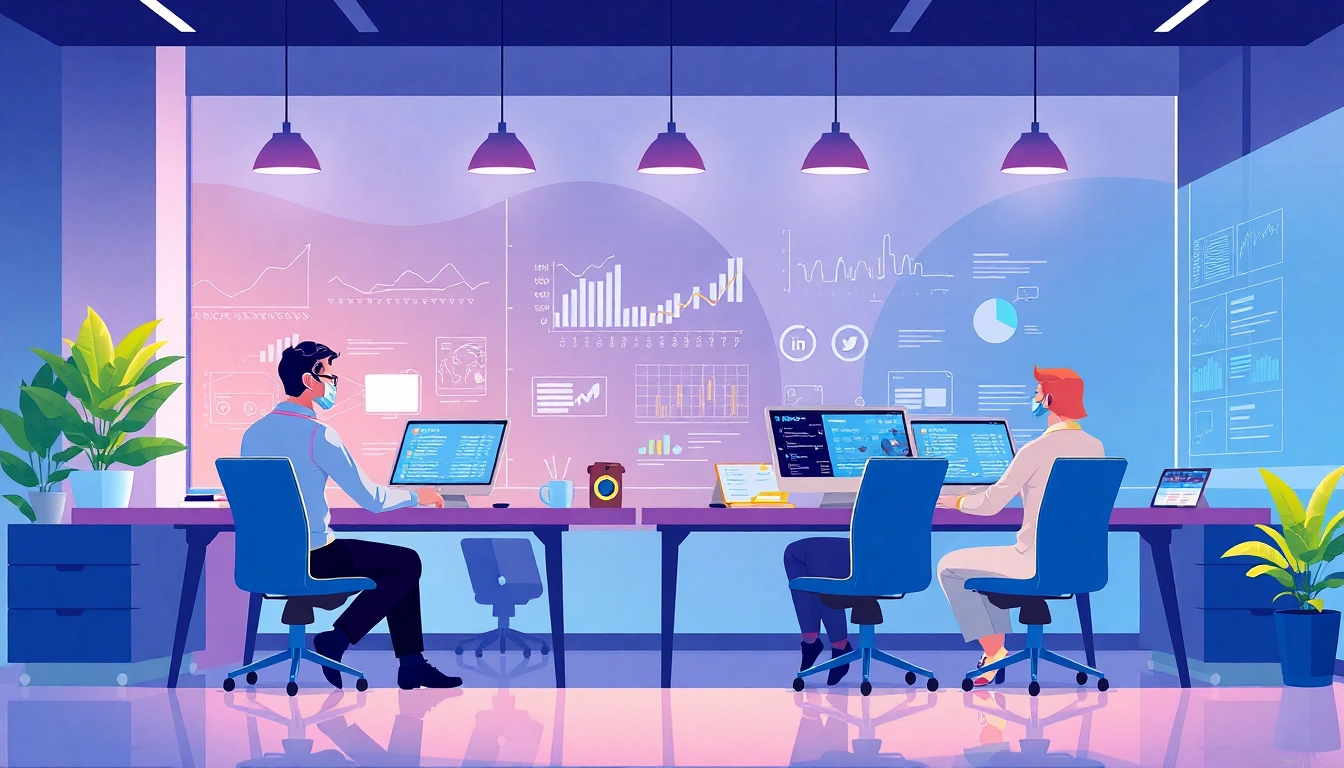Understanding AI Marketing Agents
In the rapidly evolving landscape of digital marketing, businesses are increasingly turning to innovative solutions to stay competitive and to efficiently engage their audiences. Among these solutions are AI marketing agents, sophisticated software that automates marketing tasks and enhances decision-making through artificial intelligence. These agents are not merely automated tools; they represent an intersection of technology and strategy, paving the way for deeper customer engagement and optimized marketing campaigns.
What Are AI Marketing Agents?
AI marketing agents are software applications designed to automate specific marketing functions using artificial intelligence technologies such as machine learning, data analytics, and natural language processing. These systems can handle various responsibilities, from customer segmentation and data analysis to content creation and campaign optimization. Due to their ability to operate autonomously, they require less human oversight than traditional marketing tools while still benefiting from human intervention for strategic decisions.
How They Differ from Traditional Marketing Tools
Traditional marketing tools often operate on a manual input-output basis, requiring marketers to define all actions and responses. In contrast, AI marketing agents leverage data to analyze patterns and automate responses based on predictions and insights derived from that data. This self-learning capability enables AI agents to adapt their strategies over time, making them far more efficient than their traditional counterparts. For example, while a traditional email marketing tool might send the same content to all subscribers, an AI marketing agent could analyze user behavior patterns to deliver personalized email content tailored to individual preferences, driving higher engagement rates.
Benefits of Implementing AI Marketing Agents
The integration of AI marketing agents into a marketing strategy offers multiple benefits:
- Increased Efficiency: Automating repetitive tasks allows marketers to focus on strategic planning and creative aspects.
- Data-Driven Insights: AI can analyze extensive datasets more quickly and accurately than humans, providing valuable insights to guide marketing decisions.
- Cost Savings: Reduced need for extensive manpower leads to lower operational costs, allowing organizations to allocate resources towards innovation.
- Enhanced Customer Experience: Personalized interactions driven by data analytics foster a better customer experience, increasing loyalty and retention.
- Scalability: AI solutions can grow with the business, seamlessly handling increased workloads without a drop in performance.
Key Features of Effective AI Marketing Agents
Automation of Marketing Tasks
One of the most significant features of AI marketing agents is their ability to automate essential marketing tasks. This may include sending emails, managing social media accounts, or conducting ad campaigns without requiring constant input from marketing teams. For example, AI can schedule posts across various platforms at optimal times based on audience engagement analytics, ensuring maximum visibility and interaction.
Data Analysis and Insights Generation
AI marketing agents excel in processing large volumes of data, transforming raw data into actionable insights. They can evaluate market trends, analyze customer behaviors, and perform sentiment analysis on user-generated content. By offering predictions based on these analyses, businesses can gain a competitive edge by refining their marketing strategies to meet consumer demands promptly.
Personalization and Customer Experience Enhancement
Another core feature of AI marketing agents is their ability to personalize the customer experience. By utilizing data on user preferences and past interactions, AI can tailor product recommendations, create targeted advertising campaigns, and generate personalized content. This level of customization not only enhances user satisfaction but also drives conversions, as customers are more likely to engage with content that resonates with their interests.
Top AI Marketing Agents in 2025
Leading Solutions to Consider
As we look into the future of marketing, several AI marketing agents stand out due to their innovation and effectiveness:
- HubSpot: Known for its comprehensive marketing platform, HubSpot incorporates AI to enhance user engagement and lead generation.
- Marketo: A robust marketing automation tool that offers insights and reporting features powered by AI.
- Salesforce Einstein: Salesforce’s AI component allows businesses to analyze customer data and develop personalized marketing strategies.
- Drift: This conversational marketing platform leverages AI to optimize customer interactions through chatbots capable of scheduling meetings and answering queries.
- Keenfolks: A prominent AI marketing agency connecting brands like Coca-Cola to a wealth of data and AI insights to enhance customer experiences.
Emerging Trends in AI Marketing
As we progress into 2025 and beyond, several trends are emerging in the realm of AI marketing:
- Hyper-Personalization: Advancements in AI will push marketers towards even more granular levels of personalization, tailoring content and experiences to individual user profiles.
- Predictive Analytics: A growing reliance on predictive models will allow brands to forecast future consumer behaviors with greater accuracy, optimizing marketing strategies accordingly.
- Integration with IoT: AI marketing agents will increasingly integrate with Internet of Things (IoT) devices, enabling marketers to reach consumers in real-time based on their interactions with various devices.
- Voice Search Optimization: As voice-activated devices become more prevalent, AI will provide insights on optimizing content for voice search, changing the landscape of SEO strategies.
Case Studies: Success Stories
The impact of AI marketing agents is evident in various case studies across industries:
- Sephora: The global cosmetics giant uses AI-driven tools to provide personalized product recommendations to users on their website and app, boosting sales conversions significantly.
- Netflix: By analyzing user viewing habits and preferences, Netflix utilizes AI algorithms to generate personalized content recommendations, driving user engagement and retention.
- Amazon: The retail powerhouse employs AI marketing agents to analyze customer data and personalize marketing messages, increasing purchase frequency and customer loyalty.
Best Practices for Integrating AI Marketing Agents into Your Strategy
Assessing Your Marketing Needs
Before integrating AI marketing agents, businesses must conduct a thorough assessment of their marketing needs. Understanding which marketing processes are most burdensome or less effective can help identify areas where automation can deliver the greatest impact. Stakeholder input, historical performance data, and customer feedback should be considered to inform this assessment.
Choosing the Right AI Tools
Selecting the appropriate AI marketing tools is crucial for successful implementation. Companies should seek tools that align with their existing systems, support scalability, and provide features tailored to their unique marketing goals. Factors such as ease of use, support availability, and integration capabilities with existing software should be explored.
Measuring Performance and ROI
Establishing a measurement framework for performance and return on investment (ROI) is essential. Businesses should set clear metrics and benchmarks for success to evaluate the effectiveness of their AI marketing agents. Key performance indicators may include engagement rates, conversion rates, lead generation, and overall sales. Regularly analyzing these metrics will help refine AI strategies and enhance results.
The Future of AI in Marketing
Predictions for AI Marketing Strategies
Looking ahead, AI marketing strategies will likely evolve to encompass more advanced capabilities. As AI technology matures, we can expect breakthroughs in natural language processing and predictive analytics, enabling even more sophisticated interactions with potential customers. Brands will leverage this technology to create dynamic, real-time marketing strategies that resonate with consumers milliseconds after capturing their attention.
Challenges Ahead
Despite the promising future AI marketing agents hold, several challenges persist:
- Data Privacy Concerns: As reliance on data increases, so does the need for robust data security and privacy practices to protect consumer information.
- Integration Difficulties: Businesses may encounter hurdles when integrating AI solutions into existing systems, requiring technical expertise and support.
- Resistance to Change: Organizational inertia and skepticism among team members can pose barriers to adopting AI marketing tools fully.
How to Stay Ahead of the Curve
To ensure success in embracing AI marketing agents, companies must stay informed about the latest advancements and market trends. Engaging with industry thought leaders, participating in relevant workshops, and investing in ongoing training for marketing staff can provide a competitive edge. Collaborating with AI experts will help organizations navigate complexities and maximize the potential of these innovative technologies.



